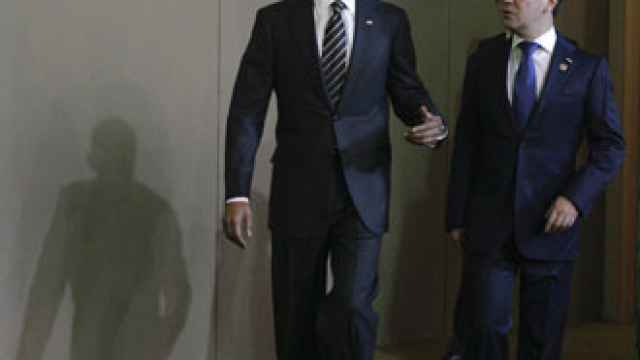Right from the start, the latest Russian spy story resembled the stuff of which Soviet spy legends are made. We have a main hero — an intelligence agent who refuses to buckle when tortured. We also have a traitor who meets face to face with the hero in his prison cell. Last week, we may have learned the name of this traitor. Depending on which media report you read, it was either Colonel Shcherbakov or Colonel Poteyev who revealed the 11 Russian “illegals” working in the United States.
Betrayal has always played a prominent role in the mythology surrounding Soviet intelligence. As Yury Kobaladze, former head of the Foreign Intelligence Service's press service, said on Channel One on Sunday, it was the traitors — not the intelligence service — who were to blame for the recent failure in the United States.
There are two main reasons why this spy flap — like every other one before it — was so blatantly misrepresented by the Kremlin and state-controlled television.
First, by dumping all the blame on the traitor, the authorities can save face. The 11 illegals were highly qualified and trained, we were told. They could have completed their assigned tasks in the United States were it not for the traitor who betrayed Russia and gave them away to U.S. authorities.
The spy fiasco was flipped on its head and spun as a huge success: The agents “penetrated” U.S. society and duped the naive Americans for more than 10 years. In this way, the Kremlin and media can assure the majority of Russians that the country is still a superpower whose intelligence services are just as good, if not better than, its arch-rival, the CIA. That is why Prime Minister Vladimir Putin sang patriotic songs with the 10 agents sent back to Russia and why President Dmitry Medvedev gave them medals for outstanding service to the motherland.
Of course, the real state of affairs within the Foreign Intelligence Service, or SVR, is much different. The SVR is the only branch within the country’s intelligence operations that was never revamped. When the division broke off from the main intelligence service in the early 1990s, this was the start and end of its “reforms.” As a result, the traditional Soviet intelligence methods, which were first developed in the first half of the 20th century and are still largely employed today, never underwent any critical review.
Soviet intelligence enjoyed its greatest successes in the 1930s and 1940s. The largest spy heroes of this period — including the Cambridge Five and Julius and Ethel Rosenberg — contribute to the mythology surrounding the Soviet Union’s intelligence capabilities. But the real reason for these successes is tied directly to the Communist International, or Comintern, an international organization uniting enthusiastic supporters of communist ideology from around the world. Soviet intelligence had a huge pool of influential leftist intellectuals from which to recruit. It was this factor more than anything else that led to their dizzying successes from the 1930s to 1950s.
But after Stalin dissolved the Comintern in 1943, Soviet intelligence had to create a special academy to prepare secret agents for work in foreign intelligence. The main goal was to replace former Cominterists with home-grown cadres — secret agents who were planted in foreign countries to assume local identities. But the return on investment from these illegals was virtually zero. In most cases, the best they could do was disguise themselves as small businessmen, and they had no access to influential Americans with valuable — much less classified — information.
Now, nearly 70 years later, the continued use of illegals is an absurd anachronism. In fact, Russia is the only country still using this practice. The latest spy flap is a case in point: The illegals spent 10 years mostly attending think tank conferences and parent-teacher meetings and were unable to produce any information of value to the SVR.
Since the 1960s, the decline of Russia’s intelligence operations has been exacerbated by corruption and nepotism. The children of senior party leaders used their residency in the United States or Western Europe as an excellent springboard for their careers, or simply as a comfortable place to live. The remarkable successes of recruiting FBI agent Robert Hanssen and CIA agent Aldrich Ames are clearly exceptions to the rule. By the beginning of the 1990s, Soviet intelligence was in such deep crisis that KGB party functionaries defected in droves to the West, taking with them detailed lists of their colleagues.
The problem is that Russia doesn’t learn from its mistakes. Nothing has been done in the past 20 years to re-evaluate SVR methods or question the sense of using severely outdated methods of gathering foreign intelligence.
In the 2000s, the Federal Security Service took control over internal security systems used by intelligence services — with the exception of the SVR. With the discovery of the mole who disclosed Russia’s secret agents operating in the United States, this may give the FSB the foundation it was looking for to extend its control over the Foreign Intelligence Service as well.
Andrei Soldatov is an intelligence analyst at Agentura.ru and co-author of “The New Nobility: The Restoration of Russia’s Security State” and “The Enduring Legacy of the KGB.”
Editor's note: An earlier version of this comment incorrectly identified Yury Kobaladze as the former head of the Foreign Intelligence Service, or SVR. He served as the head of the SVR's press service.
A Message from The Moscow Times:
Dear readers,
We are facing unprecedented challenges. Russia's Prosecutor General's Office has designated The Moscow Times as an "undesirable" organization, criminalizing our work and putting our staff at risk of prosecution. This follows our earlier unjust labeling as a "foreign agent."
These actions are direct attempts to silence independent journalism in Russia. The authorities claim our work "discredits the decisions of the Russian leadership." We see things differently: we strive to provide accurate, unbiased reporting on Russia.
We, the journalists of The Moscow Times, refuse to be silenced. But to continue our work, we need your help.
Your support, no matter how small, makes a world of difference. If you can, please support us monthly starting from just $2. It's quick to set up, and every contribution makes a significant impact.
By supporting The Moscow Times, you're defending open, independent journalism in the face of repression. Thank you for standing with us.
Remind me later.








